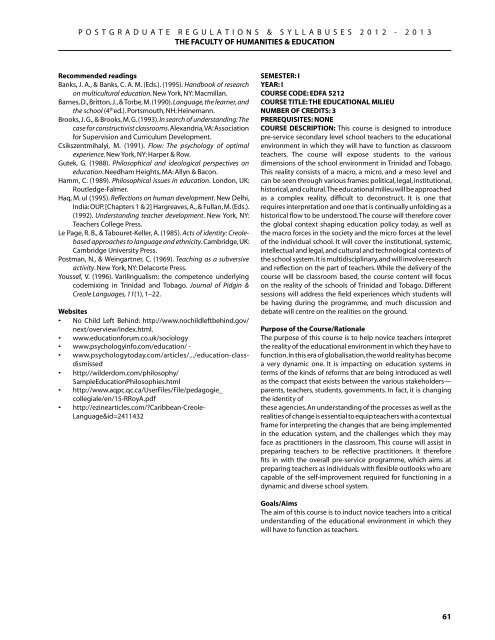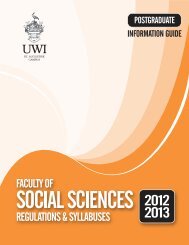Faculty of Humanities and Education (Postgraduate) - The University ...
Faculty of Humanities and Education (Postgraduate) - The University ...
Faculty of Humanities and Education (Postgraduate) - The University ...
Create successful ePaper yourself
Turn your PDF publications into a flip-book with our unique Google optimized e-Paper software.
POSTGRADUATE REGULATIONS & SYLLABUSES 2012 - 2013<br />
THE FACULTY OF HUMANITIES & EDUCATION<br />
Recommended readings<br />
Banks, J. A., & Banks, C. A. M. (Eds.). (1995). H<strong>and</strong>book <strong>of</strong> research<br />
on multicultural education. New York, NY: Macmillan.<br />
Barnes, D., Britton, J., & Torbe, M. (1990). Language, the learner, <strong>and</strong><br />
the school (4 th ed.). Portsmouth, NH: Heinemann.<br />
Brooks, J. G., & Brooks, M. G. (1993). In search <strong>of</strong> underst<strong>and</strong>ing: <strong>The</strong><br />
case for constructivist classrooms. Alex<strong>and</strong>ria, VA: Association<br />
for Supervision <strong>and</strong> Curriculum Development.<br />
Csikszentmihalyi, M. (1991). Flow: <strong>The</strong> psychology <strong>of</strong> optimal<br />
experience. New York, NY: Harper & Row.<br />
Gutek, G. (1988). Philosophical <strong>and</strong> ideological perspectives on<br />
education. Needham Heights, MA: Allyn & Bacon.<br />
Hamm, C. (1989). Philosophical issues in education. London, UK:<br />
Routledge-Falmer.<br />
Haq, M. ul (1995). Reflections on human development. New Delhi,<br />
India: OUP. [Chapters 1 & 2] Hargreaves, A., & Fullan, M. (Eds.).<br />
(1992). Underst<strong>and</strong>ing teacher development. New York, NY:<br />
Teachers College Press.<br />
Le Page, R. B., & Tabouret-Keller, A. (1985). Acts <strong>of</strong> identity: Creolebased<br />
approaches to language <strong>and</strong> ethnicity. Cambridge, UK:<br />
Cambridge <strong>University</strong> Press.<br />
Postman, N., & Weingartner, C. (1969). Teaching as a subversive<br />
activity. New York, NY: Delacorte Press.<br />
Youssef, V. (1996). Varilingualism: the competence underlying<br />
codemixing in Trinidad <strong>and</strong> Tobago. Journal <strong>of</strong> Pidgin &<br />
Creole Languages, 11(1), 1–22.<br />
Websites<br />
• No Child Left Behind: http://www.nochildleftbehind.gov/<br />
next/overview/index.html.<br />
• www.educationforum.co.uk/sociology<br />
• www.psychologyinfo.com/education/ -<br />
• www.psychologytoday.com/articles/.../education-classdismissed<br />
• http://wilderdom.com/philosophy/<br />
Sample<strong>Education</strong>Philosophies.html<br />
• http://www.aqpc.qc.ca/UserFiles/File/pedagogie_<br />
collegiale/en/15-RRoyA.pdf<br />
• http://ezinearticles.com/?Caribbean-Creole-<br />
Language&id=2411432<br />
SEMESTER: I<br />
YEAR: I<br />
COURSE CODE: EDFA 5212<br />
COURSE TITLE: THE EDUCATIONAL MILIEU<br />
NUMBER OF CREDITS: 3<br />
PREREQUISITES: NONE<br />
COURSE DESCRIPTION: This course is designed to introduce<br />
pre-service secondary level school teachers to the educational<br />
environment in which they will have to function as classroom<br />
teachers. <strong>The</strong> course will expose students to the various<br />
dimensions <strong>of</strong> the school environment in Trinidad <strong>and</strong> Tobago.<br />
This reality consists <strong>of</strong> a macro, a micro, <strong>and</strong> a meso level <strong>and</strong><br />
can be seen through various frames: political, legal, institutional,<br />
historical, <strong>and</strong> cultural. <strong>The</strong> educational milieu will be approached<br />
as a complex reality, difficult to deconstruct. It is one that<br />
requires interpretation <strong>and</strong> one that is continually unfolding as a<br />
historical flow to be understood. <strong>The</strong> course will therefore cover<br />
the global context shaping education policy today, as well as<br />
the macro forces in the society <strong>and</strong> the micro forces at the level<br />
<strong>of</strong> the individual school. It will cover the institutional, systemic,<br />
intellectual <strong>and</strong> legal, <strong>and</strong> cultural <strong>and</strong> technological contexts <strong>of</strong><br />
the school system. It is multidisciplinary, <strong>and</strong> will involve research<br />
<strong>and</strong> reflection on the part <strong>of</strong> teachers. While the delivery <strong>of</strong> the<br />
course will be classroom based, the course content will focus<br />
on the reality <strong>of</strong> the schools <strong>of</strong> Trinidad <strong>and</strong> Tobago. Different<br />
sessions will address the field experiences which students will<br />
be having during the programme, <strong>and</strong> much discussion <strong>and</strong><br />
debate will centre on the realities on the ground.<br />
Purpose <strong>of</strong> the Course/Rationale<br />
<strong>The</strong> purpose <strong>of</strong> this course is to help novice teachers interpret<br />
the reality <strong>of</strong> the educational environment in which they have to<br />
function. In this era <strong>of</strong> globalisation, the world reality has become<br />
a very dynamic one. It is impacting on education systems in<br />
terms <strong>of</strong> the kinds <strong>of</strong> reforms that are being introduced as well<br />
as the compact that exists between the various stakeholders—<br />
parents, teachers, students, governments. In fact, it is changing<br />
the identity <strong>of</strong><br />
these agencies. An underst<strong>and</strong>ing <strong>of</strong> the processes as well as the<br />
realities <strong>of</strong> change is essential to equip teachers with a contextual<br />
frame for interpreting the changes that are being implemented<br />
in the education system, <strong>and</strong> the challenges which they may<br />
face as practitioners in the classroom. This course will assist in<br />
preparing teachers to be reflective practitioners. It therefore<br />
fits in with the overall pre-service programme, which aims at<br />
preparing teachers as individuals with flexible outlooks who are<br />
capable <strong>of</strong> the self-improvement required for functioning in a<br />
dynamic <strong>and</strong> diverse school system.<br />
Goals/Aims<br />
<strong>The</strong> aim <strong>of</strong> this course is to induct novice teachers into a critical<br />
underst<strong>and</strong>ing <strong>of</strong> the educational environment in which they<br />
will have to function as teachers.<br />
61

















